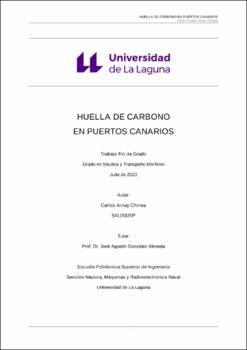Huella de carbono en puertos canarios
Author
Arnay Chinea, CarlosDate
2023Abstract
En primer lugar, el presente Trabajo de Fin de Grado utilizará la información de
diferentes fuentes para centrase en la huella de carbono con una especial mención en los
puertos de las Islas Canarias con un adicional ranking de los países Europeos más
contaminantes, en relación a las emisiones de gases de efecto invernadero, al igual que se
analizó el impacto ambiental y en la salud de estos gases en la atmosfera como resultado de
las operaciones portuarias y las actividades de transporte marítimo, haciendo énfasis en la
urgencia por abordar este tema de preocupación global.
En segundo lugar, el estudio hace un análisis de las regulaciones y normativas
vigentes, para la reducción de emisiones contaminantes y de la huella de carbono en el sector
marítimo en buques nuevos y existentes, así como se destaca también los acuerdos más
importantes entre los países del mundo y la necesidad de implementar políticas y protocolos
efectivos que promuevan la eficiencia energética, con el objetivo de mitigar el impacto
ambiental y avanzar hacia una navegación más sostenible.
Por último, se exploran y estudian diversas tecnologías innovadoras como soluciones
para reducir la huella de carbono en el transporte naval, donde se ha incluido un sistema de
lubricación por aire con su respectivo método de funcionamiento, el uso de buques a vela y el
desarrollo de combustibles alternativos como el gas natural licuado y el hidrógeno verde. Firstly, this Final Degree Project will use information from different sources to focus on
the carbon footprint with a special mention in the ports of the Canary Islands with an additional
ranking of the most polluting European countries, in relation to greenhouse gas emissions, as
well as analyzing the environmental and health impact of these gases in the atmosphere as a
result of port operations and shipping activities, emphasizing the urgency to address this issue
of global concern.
Secondly, the study analyzes current regulations and standards for the reduction of
pollutant emissions and carbon footprint in the maritime sector in new and existing ships, as
well as highlighting the most important agreements between countries around the world and
the need to implement effective policies and protocols that promote energy efficiency, in order
to mitigate the environmental impact and move towards a more sustainable shipping.
Finally, several innovative technologies are explored and studied as solutions to reduce
the carbon footprint in shipping, where an air lubrication system with its respective method of
operation, the use of sailing ships and the development of alternative fuels such as liquefied
natural gas and green hydrogen have been included.





